Nursing Leadership and Management Report - University Name
VerifiedAdded on 2022/08/23
|10
|2412
|14
Report
AI Summary
This report provides a detailed analysis of nursing leadership and management, based on an interview with a Registered Nurse (RN). The paper explores key leadership characteristics, including empathy, inspirational motivation, and individual consideration, and their influence on professional career practices. The RN's skills in motivating the nursing workforce, adapting to individual needs, and demonstrating empathy are highlighted. The report connects these characteristics to transformational leadership styles and their impact on patient safety and quality outcomes. The student reflects on how these leadership qualities can be applied in their future nursing career. The report also references relevant literature on leadership and management in nursing, including the National Safety and Quality Health Service Standards. The assignment highlights the importance of interpersonal communication and supervision in nursing practice.
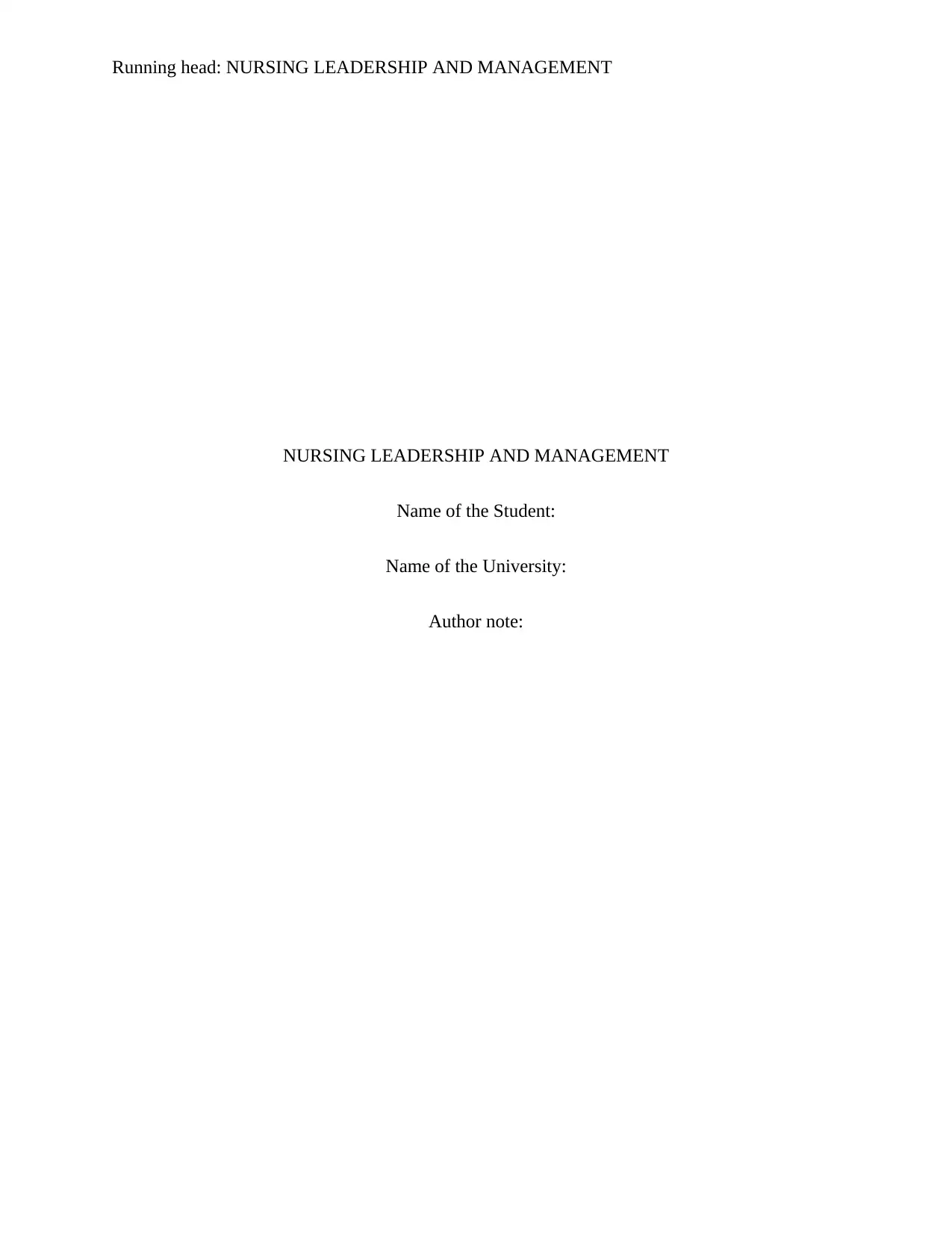
Running head: NURSING LEADERSHIP AND MANAGEMENT
NURSING LEADERSHIP AND MANAGEMENT
Name of the Student:
Name of the University:
Author note:
NURSING LEADERSHIP AND MANAGEMENT
Name of the Student:
Name of the University:
Author note:
Paraphrase This Document
Need a fresh take? Get an instant paraphrase of this document with our AI Paraphraser
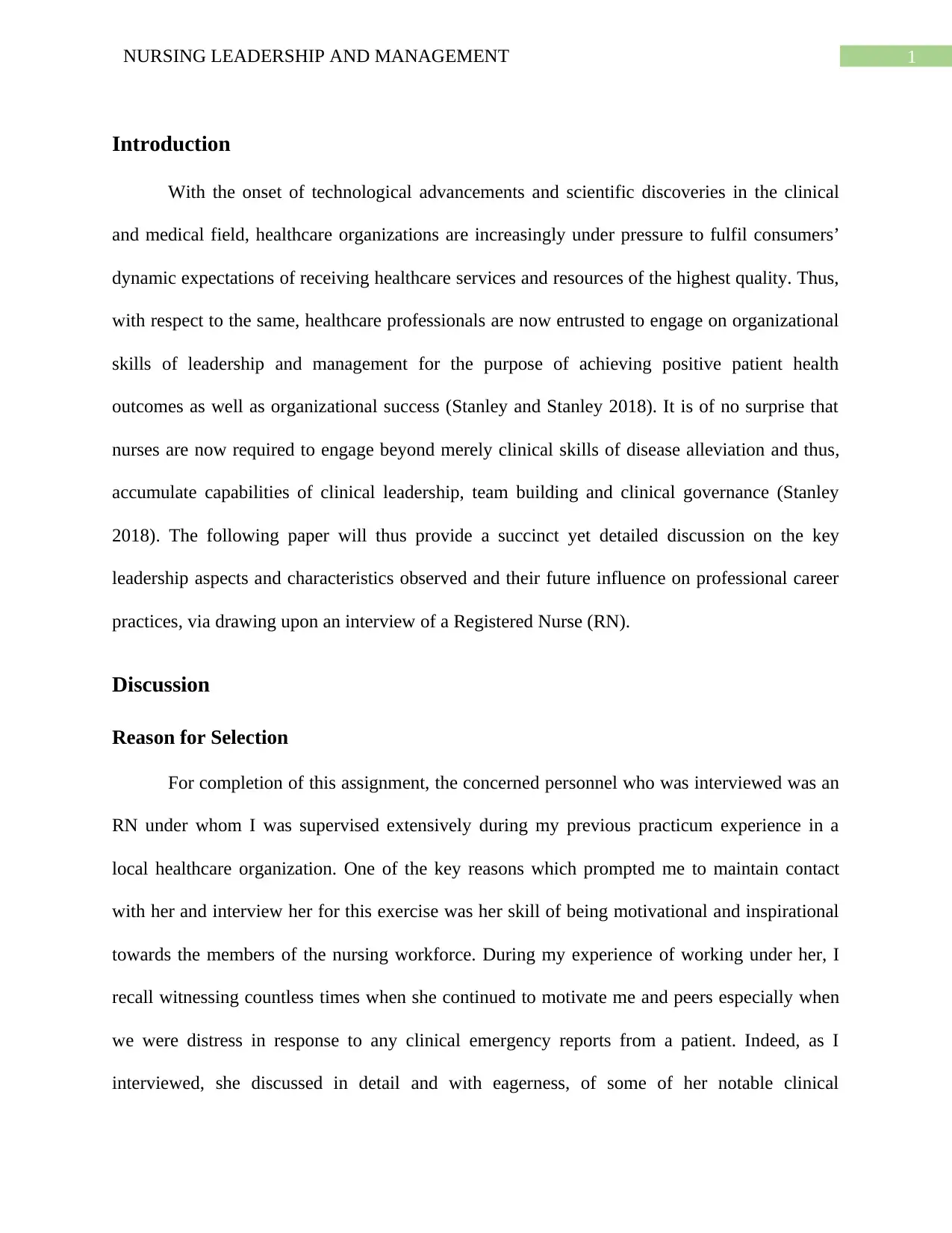
1NURSING LEADERSHIP AND MANAGEMENT
Introduction
With the onset of technological advancements and scientific discoveries in the clinical
and medical field, healthcare organizations are increasingly under pressure to fulfil consumers’
dynamic expectations of receiving healthcare services and resources of the highest quality. Thus,
with respect to the same, healthcare professionals are now entrusted to engage on organizational
skills of leadership and management for the purpose of achieving positive patient health
outcomes as well as organizational success (Stanley and Stanley 2018). It is of no surprise that
nurses are now required to engage beyond merely clinical skills of disease alleviation and thus,
accumulate capabilities of clinical leadership, team building and clinical governance (Stanley
2018). The following paper will thus provide a succinct yet detailed discussion on the key
leadership aspects and characteristics observed and their future influence on professional career
practices, via drawing upon an interview of a Registered Nurse (RN).
Discussion
Reason for Selection
For completion of this assignment, the concerned personnel who was interviewed was an
RN under whom I was supervised extensively during my previous practicum experience in a
local healthcare organization. One of the key reasons which prompted me to maintain contact
with her and interview her for this exercise was her skill of being motivational and inspirational
towards the members of the nursing workforce. During my experience of working under her, I
recall witnessing countless times when she continued to motivate me and peers especially when
we were distress in response to any clinical emergency reports from a patient. Indeed, as I
interviewed, she discussed in detail and with eagerness, of some of her notable clinical
Introduction
With the onset of technological advancements and scientific discoveries in the clinical
and medical field, healthcare organizations are increasingly under pressure to fulfil consumers’
dynamic expectations of receiving healthcare services and resources of the highest quality. Thus,
with respect to the same, healthcare professionals are now entrusted to engage on organizational
skills of leadership and management for the purpose of achieving positive patient health
outcomes as well as organizational success (Stanley and Stanley 2018). It is of no surprise that
nurses are now required to engage beyond merely clinical skills of disease alleviation and thus,
accumulate capabilities of clinical leadership, team building and clinical governance (Stanley
2018). The following paper will thus provide a succinct yet detailed discussion on the key
leadership aspects and characteristics observed and their future influence on professional career
practices, via drawing upon an interview of a Registered Nurse (RN).
Discussion
Reason for Selection
For completion of this assignment, the concerned personnel who was interviewed was an
RN under whom I was supervised extensively during my previous practicum experience in a
local healthcare organization. One of the key reasons which prompted me to maintain contact
with her and interview her for this exercise was her skill of being motivational and inspirational
towards the members of the nursing workforce. During my experience of working under her, I
recall witnessing countless times when she continued to motivate me and peers especially when
we were distress in response to any clinical emergency reports from a patient. Indeed, as I
interviewed, she discussed in detail and with eagerness, of some of her notable clinical
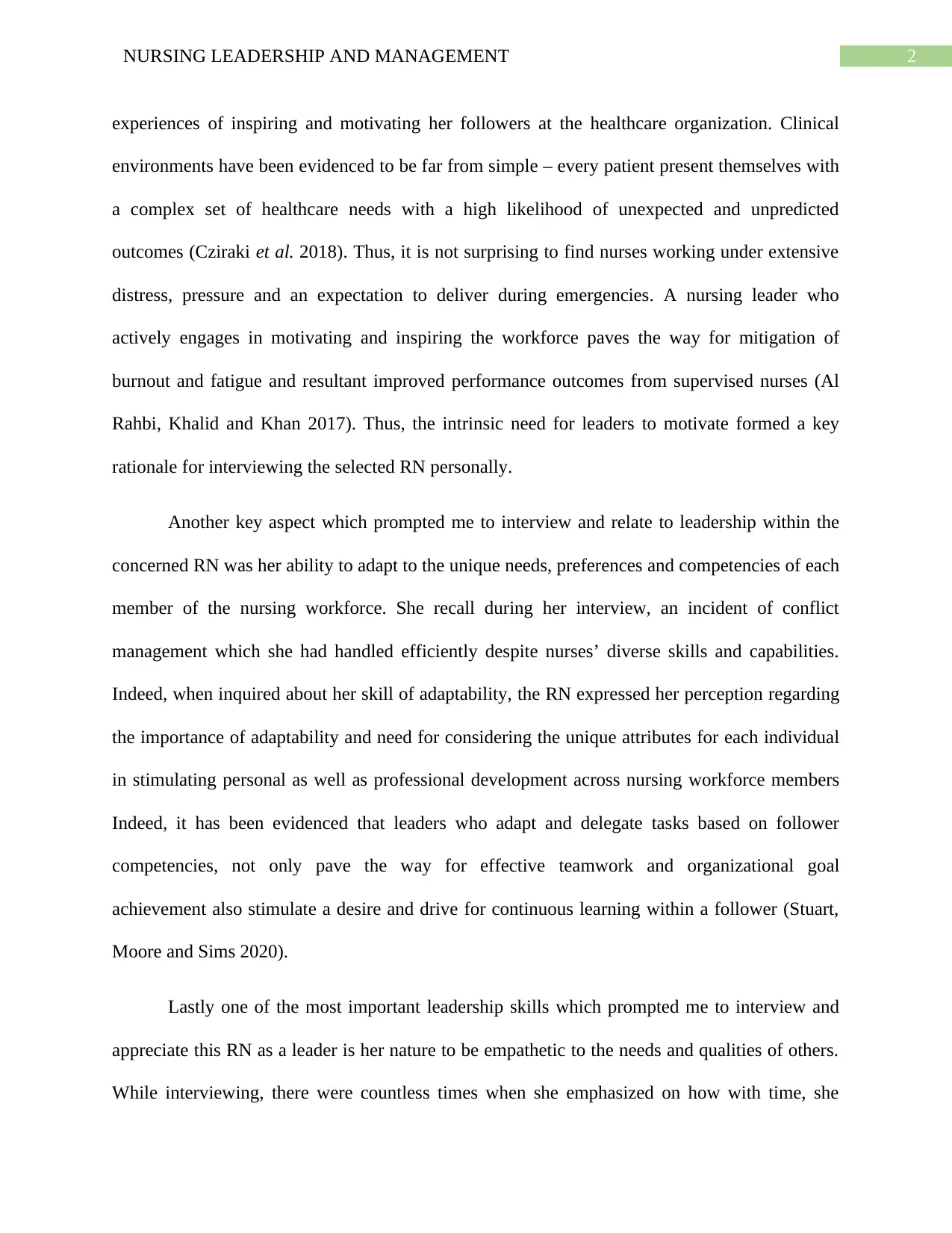
2NURSING LEADERSHIP AND MANAGEMENT
experiences of inspiring and motivating her followers at the healthcare organization. Clinical
environments have been evidenced to be far from simple – every patient present themselves with
a complex set of healthcare needs with a high likelihood of unexpected and unpredicted
outcomes (Cziraki et al. 2018). Thus, it is not surprising to find nurses working under extensive
distress, pressure and an expectation to deliver during emergencies. A nursing leader who
actively engages in motivating and inspiring the workforce paves the way for mitigation of
burnout and fatigue and resultant improved performance outcomes from supervised nurses (Al
Rahbi, Khalid and Khan 2017). Thus, the intrinsic need for leaders to motivate formed a key
rationale for interviewing the selected RN personally.
Another key aspect which prompted me to interview and relate to leadership within the
concerned RN was her ability to adapt to the unique needs, preferences and competencies of each
member of the nursing workforce. She recall during her interview, an incident of conflict
management which she had handled efficiently despite nurses’ diverse skills and capabilities.
Indeed, when inquired about her skill of adaptability, the RN expressed her perception regarding
the importance of adaptability and need for considering the unique attributes for each individual
in stimulating personal as well as professional development across nursing workforce members
Indeed, it has been evidenced that leaders who adapt and delegate tasks based on follower
competencies, not only pave the way for effective teamwork and organizational goal
achievement also stimulate a desire and drive for continuous learning within a follower (Stuart,
Moore and Sims 2020).
Lastly one of the most important leadership skills which prompted me to interview and
appreciate this RN as a leader is her nature to be empathetic to the needs and qualities of others.
While interviewing, there were countless times when she emphasized on how with time, she
experiences of inspiring and motivating her followers at the healthcare organization. Clinical
environments have been evidenced to be far from simple – every patient present themselves with
a complex set of healthcare needs with a high likelihood of unexpected and unpredicted
outcomes (Cziraki et al. 2018). Thus, it is not surprising to find nurses working under extensive
distress, pressure and an expectation to deliver during emergencies. A nursing leader who
actively engages in motivating and inspiring the workforce paves the way for mitigation of
burnout and fatigue and resultant improved performance outcomes from supervised nurses (Al
Rahbi, Khalid and Khan 2017). Thus, the intrinsic need for leaders to motivate formed a key
rationale for interviewing the selected RN personally.
Another key aspect which prompted me to interview and relate to leadership within the
concerned RN was her ability to adapt to the unique needs, preferences and competencies of each
member of the nursing workforce. She recall during her interview, an incident of conflict
management which she had handled efficiently despite nurses’ diverse skills and capabilities.
Indeed, when inquired about her skill of adaptability, the RN expressed her perception regarding
the importance of adaptability and need for considering the unique attributes for each individual
in stimulating personal as well as professional development across nursing workforce members
Indeed, it has been evidenced that leaders who adapt and delegate tasks based on follower
competencies, not only pave the way for effective teamwork and organizational goal
achievement also stimulate a desire and drive for continuous learning within a follower (Stuart,
Moore and Sims 2020).
Lastly one of the most important leadership skills which prompted me to interview and
appreciate this RN as a leader is her nature to be empathetic to the needs and qualities of others.
While interviewing, there were countless times when she emphasized on how with time, she
⊘ This is a preview!⊘
Do you want full access?
Subscribe today to unlock all pages.

Trusted by 1+ million students worldwide
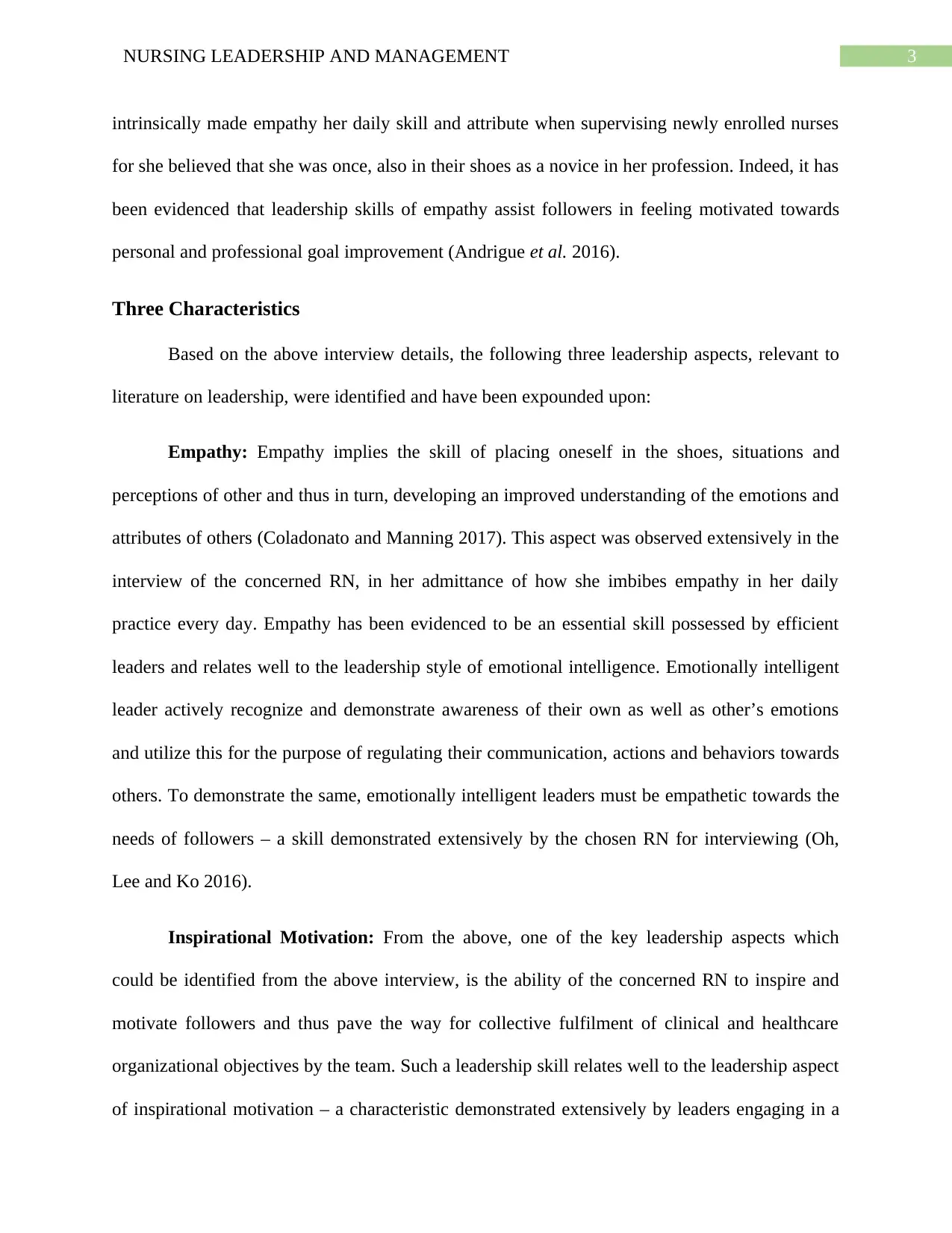
3NURSING LEADERSHIP AND MANAGEMENT
intrinsically made empathy her daily skill and attribute when supervising newly enrolled nurses
for she believed that she was once, also in their shoes as a novice in her profession. Indeed, it has
been evidenced that leadership skills of empathy assist followers in feeling motivated towards
personal and professional goal improvement (Andrigue et al. 2016).
Three Characteristics
Based on the above interview details, the following three leadership aspects, relevant to
literature on leadership, were identified and have been expounded upon:
Empathy: Empathy implies the skill of placing oneself in the shoes, situations and
perceptions of other and thus in turn, developing an improved understanding of the emotions and
attributes of others (Coladonato and Manning 2017). This aspect was observed extensively in the
interview of the concerned RN, in her admittance of how she imbibes empathy in her daily
practice every day. Empathy has been evidenced to be an essential skill possessed by efficient
leaders and relates well to the leadership style of emotional intelligence. Emotionally intelligent
leader actively recognize and demonstrate awareness of their own as well as other’s emotions
and utilize this for the purpose of regulating their communication, actions and behaviors towards
others. To demonstrate the same, emotionally intelligent leaders must be empathetic towards the
needs of followers – a skill demonstrated extensively by the chosen RN for interviewing (Oh,
Lee and Ko 2016).
Inspirational Motivation: From the above, one of the key leadership aspects which
could be identified from the above interview, is the ability of the concerned RN to inspire and
motivate followers and thus pave the way for collective fulfilment of clinical and healthcare
organizational objectives by the team. Such a leadership skill relates well to the leadership aspect
of inspirational motivation – a characteristic demonstrated extensively by leaders engaging in a
intrinsically made empathy her daily skill and attribute when supervising newly enrolled nurses
for she believed that she was once, also in their shoes as a novice in her profession. Indeed, it has
been evidenced that leadership skills of empathy assist followers in feeling motivated towards
personal and professional goal improvement (Andrigue et al. 2016).
Three Characteristics
Based on the above interview details, the following three leadership aspects, relevant to
literature on leadership, were identified and have been expounded upon:
Empathy: Empathy implies the skill of placing oneself in the shoes, situations and
perceptions of other and thus in turn, developing an improved understanding of the emotions and
attributes of others (Coladonato and Manning 2017). This aspect was observed extensively in the
interview of the concerned RN, in her admittance of how she imbibes empathy in her daily
practice every day. Empathy has been evidenced to be an essential skill possessed by efficient
leaders and relates well to the leadership style of emotional intelligence. Emotionally intelligent
leader actively recognize and demonstrate awareness of their own as well as other’s emotions
and utilize this for the purpose of regulating their communication, actions and behaviors towards
others. To demonstrate the same, emotionally intelligent leaders must be empathetic towards the
needs of followers – a skill demonstrated extensively by the chosen RN for interviewing (Oh,
Lee and Ko 2016).
Inspirational Motivation: From the above, one of the key leadership aspects which
could be identified from the above interview, is the ability of the concerned RN to inspire and
motivate followers and thus pave the way for collective fulfilment of clinical and healthcare
organizational objectives by the team. Such a leadership skill relates well to the leadership aspect
of inspirational motivation – a characteristic demonstrated extensively by leaders engaging in a
Paraphrase This Document
Need a fresh take? Get an instant paraphrase of this document with our AI Paraphraser
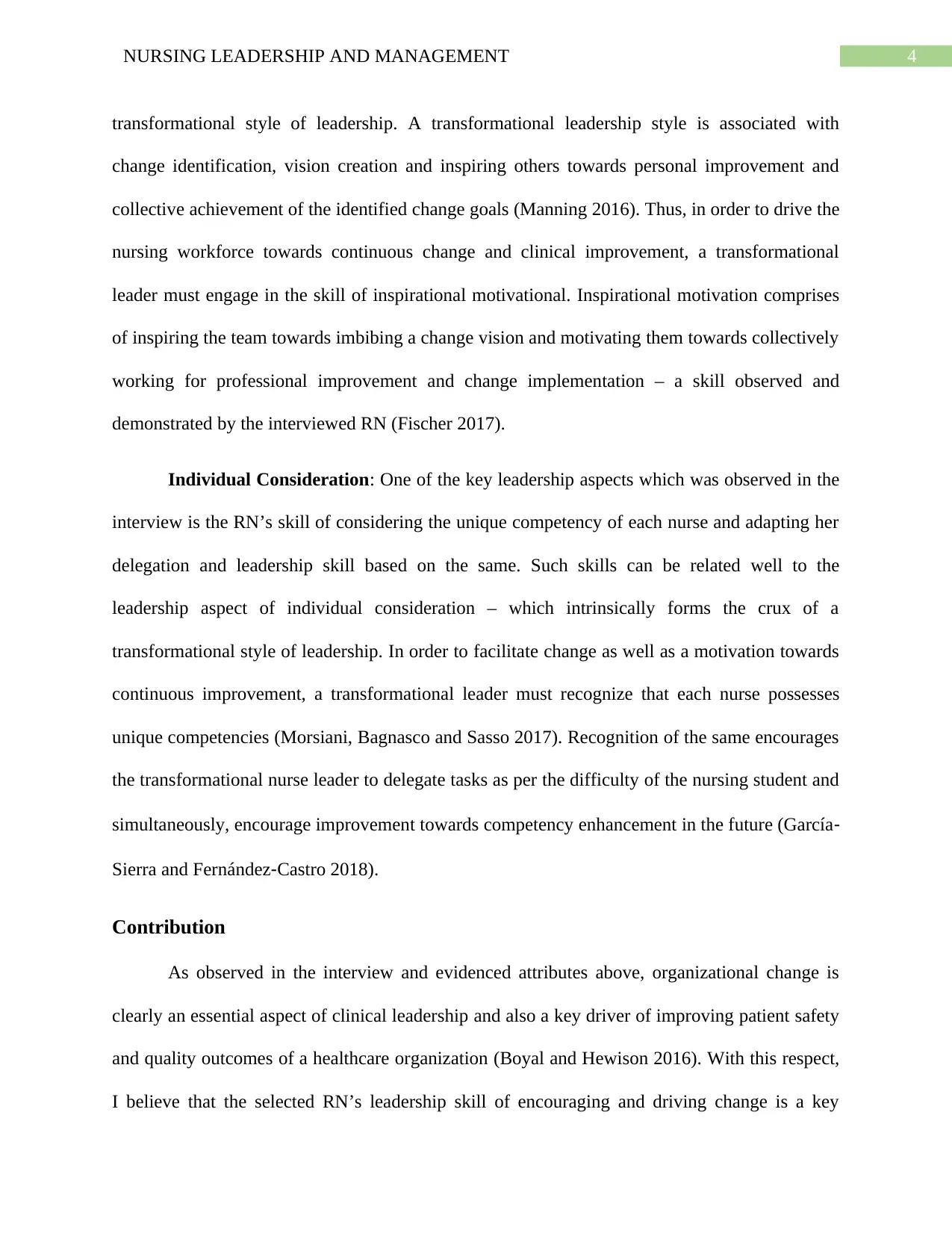
4NURSING LEADERSHIP AND MANAGEMENT
transformational style of leadership. A transformational leadership style is associated with
change identification, vision creation and inspiring others towards personal improvement and
collective achievement of the identified change goals (Manning 2016). Thus, in order to drive the
nursing workforce towards continuous change and clinical improvement, a transformational
leader must engage in the skill of inspirational motivational. Inspirational motivation comprises
of inspiring the team towards imbibing a change vision and motivating them towards collectively
working for professional improvement and change implementation – a skill observed and
demonstrated by the interviewed RN (Fischer 2017).
Individual Consideration: One of the key leadership aspects which was observed in the
interview is the RN’s skill of considering the unique competency of each nurse and adapting her
delegation and leadership skill based on the same. Such skills can be related well to the
leadership aspect of individual consideration – which intrinsically forms the crux of a
transformational style of leadership. In order to facilitate change as well as a motivation towards
continuous improvement, a transformational leader must recognize that each nurse possesses
unique competencies (Morsiani, Bagnasco and Sasso 2017). Recognition of the same encourages
the transformational nurse leader to delegate tasks as per the difficulty of the nursing student and
simultaneously, encourage improvement towards competency enhancement in the future (García‐
Sierra and Fernández‐Castro 2018).
Contribution
As observed in the interview and evidenced attributes above, organizational change is
clearly an essential aspect of clinical leadership and also a key driver of improving patient safety
and quality outcomes of a healthcare organization (Boyal and Hewison 2016). With this respect,
I believe that the selected RN’s leadership skill of encouraging and driving change is a key
transformational style of leadership. A transformational leadership style is associated with
change identification, vision creation and inspiring others towards personal improvement and
collective achievement of the identified change goals (Manning 2016). Thus, in order to drive the
nursing workforce towards continuous change and clinical improvement, a transformational
leader must engage in the skill of inspirational motivational. Inspirational motivation comprises
of inspiring the team towards imbibing a change vision and motivating them towards collectively
working for professional improvement and change implementation – a skill observed and
demonstrated by the interviewed RN (Fischer 2017).
Individual Consideration: One of the key leadership aspects which was observed in the
interview is the RN’s skill of considering the unique competency of each nurse and adapting her
delegation and leadership skill based on the same. Such skills can be related well to the
leadership aspect of individual consideration – which intrinsically forms the crux of a
transformational style of leadership. In order to facilitate change as well as a motivation towards
continuous improvement, a transformational leader must recognize that each nurse possesses
unique competencies (Morsiani, Bagnasco and Sasso 2017). Recognition of the same encourages
the transformational nurse leader to delegate tasks as per the difficulty of the nursing student and
simultaneously, encourage improvement towards competency enhancement in the future (García‐
Sierra and Fernández‐Castro 2018).
Contribution
As observed in the interview and evidenced attributes above, organizational change is
clearly an essential aspect of clinical leadership and also a key driver of improving patient safety
and quality outcomes of a healthcare organization (Boyal and Hewison 2016). With this respect,
I believe that the selected RN’s leadership skill of encouraging and driving change is a key
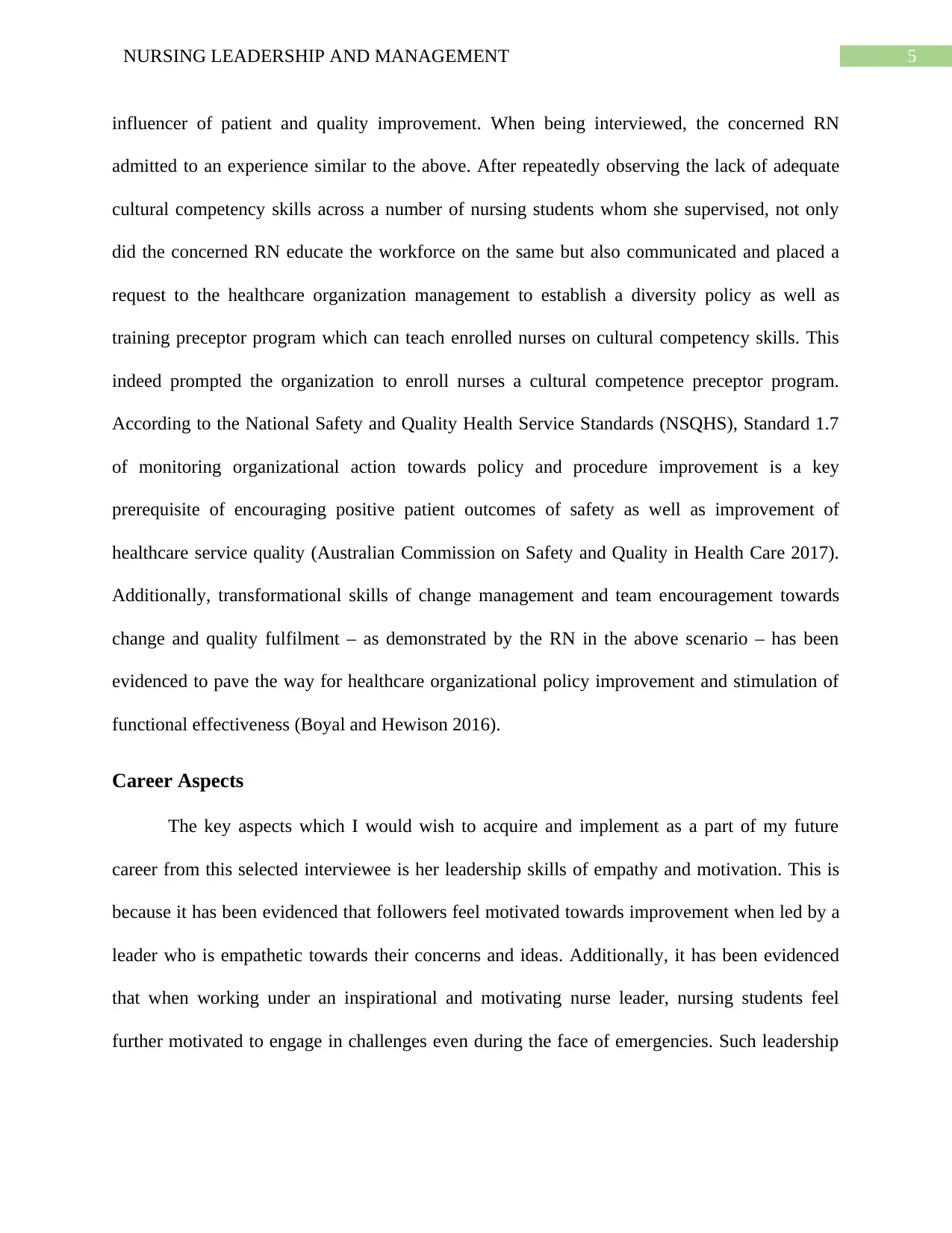
5NURSING LEADERSHIP AND MANAGEMENT
influencer of patient and quality improvement. When being interviewed, the concerned RN
admitted to an experience similar to the above. After repeatedly observing the lack of adequate
cultural competency skills across a number of nursing students whom she supervised, not only
did the concerned RN educate the workforce on the same but also communicated and placed a
request to the healthcare organization management to establish a diversity policy as well as
training preceptor program which can teach enrolled nurses on cultural competency skills. This
indeed prompted the organization to enroll nurses a cultural competence preceptor program.
According to the National Safety and Quality Health Service Standards (NSQHS), Standard 1.7
of monitoring organizational action towards policy and procedure improvement is a key
prerequisite of encouraging positive patient outcomes of safety as well as improvement of
healthcare service quality (Australian Commission on Safety and Quality in Health Care 2017).
Additionally, transformational skills of change management and team encouragement towards
change and quality fulfilment – as demonstrated by the RN in the above scenario – has been
evidenced to pave the way for healthcare organizational policy improvement and stimulation of
functional effectiveness (Boyal and Hewison 2016).
Career Aspects
The key aspects which I would wish to acquire and implement as a part of my future
career from this selected interviewee is her leadership skills of empathy and motivation. This is
because it has been evidenced that followers feel motivated towards improvement when led by a
leader who is empathetic towards their concerns and ideas. Additionally, it has been evidenced
that when working under an inspirational and motivating nurse leader, nursing students feel
further motivated to engage in challenges even during the face of emergencies. Such leadership
influencer of patient and quality improvement. When being interviewed, the concerned RN
admitted to an experience similar to the above. After repeatedly observing the lack of adequate
cultural competency skills across a number of nursing students whom she supervised, not only
did the concerned RN educate the workforce on the same but also communicated and placed a
request to the healthcare organization management to establish a diversity policy as well as
training preceptor program which can teach enrolled nurses on cultural competency skills. This
indeed prompted the organization to enroll nurses a cultural competence preceptor program.
According to the National Safety and Quality Health Service Standards (NSQHS), Standard 1.7
of monitoring organizational action towards policy and procedure improvement is a key
prerequisite of encouraging positive patient outcomes of safety as well as improvement of
healthcare service quality (Australian Commission on Safety and Quality in Health Care 2017).
Additionally, transformational skills of change management and team encouragement towards
change and quality fulfilment – as demonstrated by the RN in the above scenario – has been
evidenced to pave the way for healthcare organizational policy improvement and stimulation of
functional effectiveness (Boyal and Hewison 2016).
Career Aspects
The key aspects which I would wish to acquire and implement as a part of my future
career from this selected interviewee is her leadership skills of empathy and motivation. This is
because it has been evidenced that followers feel motivated towards improvement when led by a
leader who is empathetic towards their concerns and ideas. Additionally, it has been evidenced
that when working under an inspirational and motivating nurse leader, nursing students feel
further motivated to engage in challenges even during the face of emergencies. Such leadership
⊘ This is a preview!⊘
Do you want full access?
Subscribe today to unlock all pages.

Trusted by 1+ million students worldwide
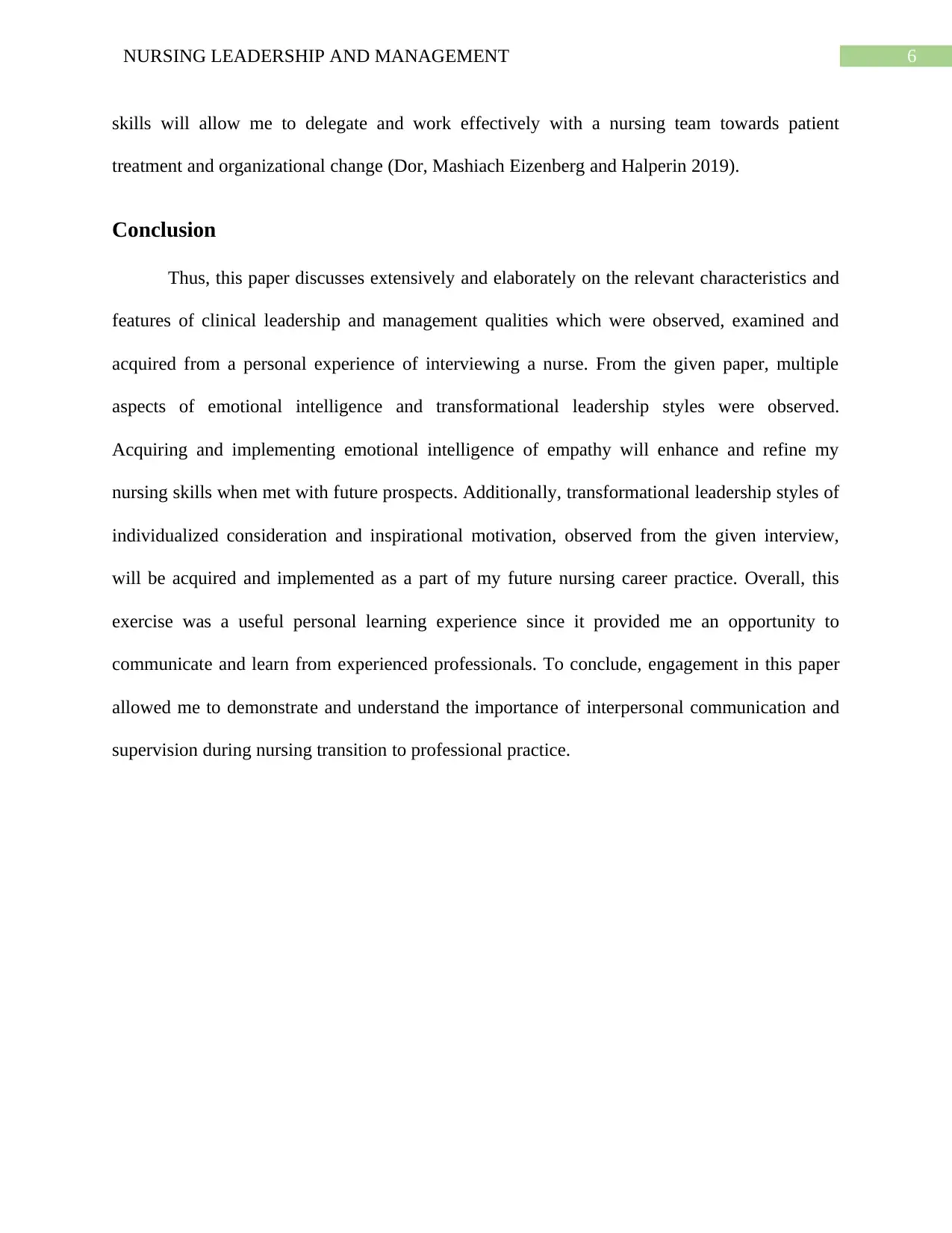
6NURSING LEADERSHIP AND MANAGEMENT
skills will allow me to delegate and work effectively with a nursing team towards patient
treatment and organizational change (Dor, Mashiach Eizenberg and Halperin 2019).
Conclusion
Thus, this paper discusses extensively and elaborately on the relevant characteristics and
features of clinical leadership and management qualities which were observed, examined and
acquired from a personal experience of interviewing a nurse. From the given paper, multiple
aspects of emotional intelligence and transformational leadership styles were observed.
Acquiring and implementing emotional intelligence of empathy will enhance and refine my
nursing skills when met with future prospects. Additionally, transformational leadership styles of
individualized consideration and inspirational motivation, observed from the given interview,
will be acquired and implemented as a part of my future nursing career practice. Overall, this
exercise was a useful personal learning experience since it provided me an opportunity to
communicate and learn from experienced professionals. To conclude, engagement in this paper
allowed me to demonstrate and understand the importance of interpersonal communication and
supervision during nursing transition to professional practice.
skills will allow me to delegate and work effectively with a nursing team towards patient
treatment and organizational change (Dor, Mashiach Eizenberg and Halperin 2019).
Conclusion
Thus, this paper discusses extensively and elaborately on the relevant characteristics and
features of clinical leadership and management qualities which were observed, examined and
acquired from a personal experience of interviewing a nurse. From the given paper, multiple
aspects of emotional intelligence and transformational leadership styles were observed.
Acquiring and implementing emotional intelligence of empathy will enhance and refine my
nursing skills when met with future prospects. Additionally, transformational leadership styles of
individualized consideration and inspirational motivation, observed from the given interview,
will be acquired and implemented as a part of my future nursing career practice. Overall, this
exercise was a useful personal learning experience since it provided me an opportunity to
communicate and learn from experienced professionals. To conclude, engagement in this paper
allowed me to demonstrate and understand the importance of interpersonal communication and
supervision during nursing transition to professional practice.
Paraphrase This Document
Need a fresh take? Get an instant paraphrase of this document with our AI Paraphraser
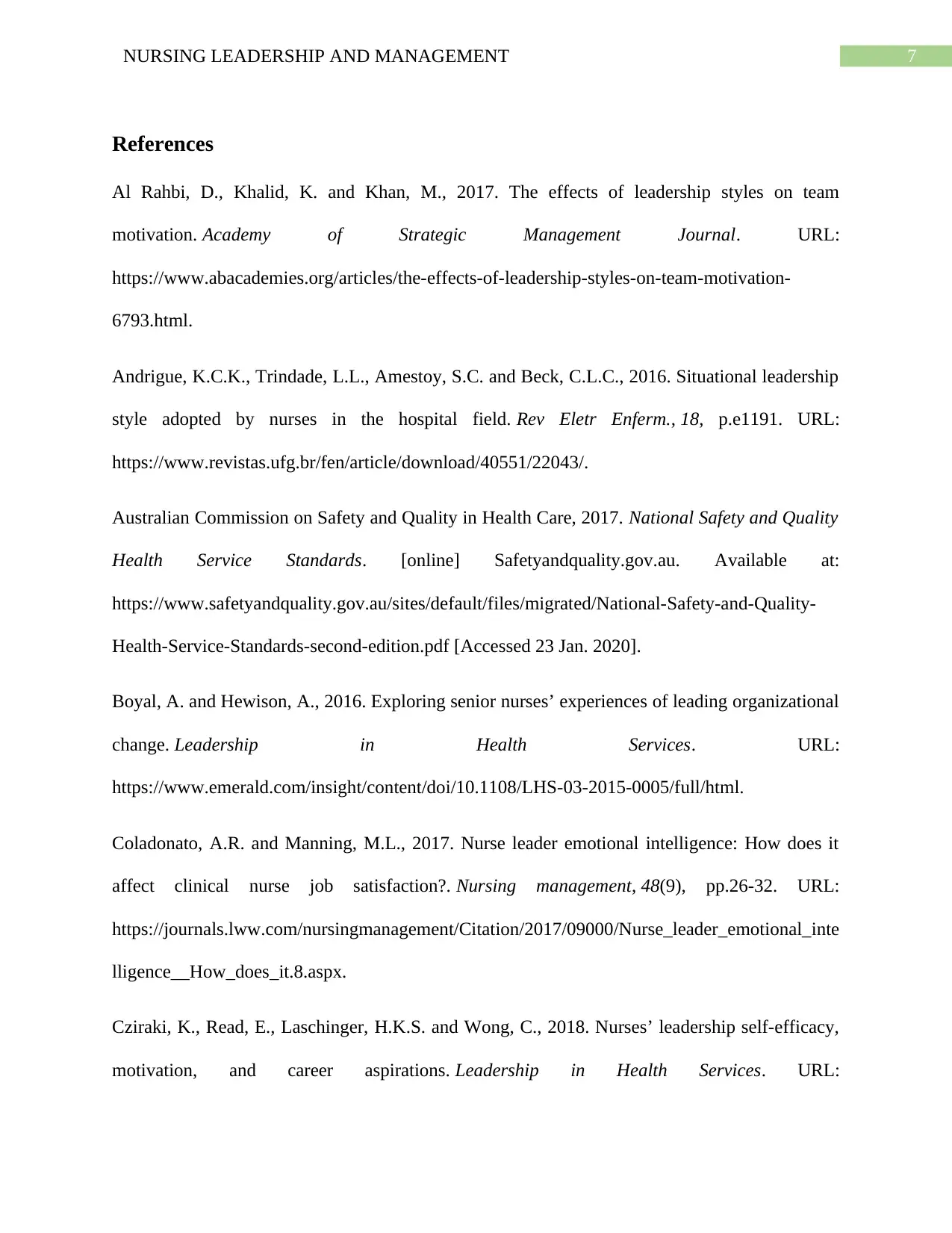
7NURSING LEADERSHIP AND MANAGEMENT
References
Al Rahbi, D., Khalid, K. and Khan, M., 2017. The effects of leadership styles on team
motivation. Academy of Strategic Management Journal. URL:
https://www.abacademies.org/articles/the-effects-of-leadership-styles-on-team-motivation-
6793.html.
Andrigue, K.C.K., Trindade, L.L., Amestoy, S.C. and Beck, C.L.C., 2016. Situational leadership
style adopted by nurses in the hospital field. Rev Eletr Enferm., 18, p.e1191. URL:
https://www.revistas.ufg.br/fen/article/download/40551/22043/.
Australian Commission on Safety and Quality in Health Care, 2017. National Safety and Quality
Health Service Standards. [online] Safetyandquality.gov.au. Available at:
https://www.safetyandquality.gov.au/sites/default/files/migrated/National-Safety-and-Quality-
Health-Service-Standards-second-edition.pdf [Accessed 23 Jan. 2020].
Boyal, A. and Hewison, A., 2016. Exploring senior nurses’ experiences of leading organizational
change. Leadership in Health Services. URL:
https://www.emerald.com/insight/content/doi/10.1108/LHS-03-2015-0005/full/html.
Coladonato, A.R. and Manning, M.L., 2017. Nurse leader emotional intelligence: How does it
affect clinical nurse job satisfaction?. Nursing management, 48(9), pp.26-32. URL:
https://journals.lww.com/nursingmanagement/Citation/2017/09000/Nurse_leader_emotional_inte
lligence__How_does_it.8.aspx.
Cziraki, K., Read, E., Laschinger, H.K.S. and Wong, C., 2018. Nurses’ leadership self-efficacy,
motivation, and career aspirations. Leadership in Health Services. URL:
References
Al Rahbi, D., Khalid, K. and Khan, M., 2017. The effects of leadership styles on team
motivation. Academy of Strategic Management Journal. URL:
https://www.abacademies.org/articles/the-effects-of-leadership-styles-on-team-motivation-
6793.html.
Andrigue, K.C.K., Trindade, L.L., Amestoy, S.C. and Beck, C.L.C., 2016. Situational leadership
style adopted by nurses in the hospital field. Rev Eletr Enferm., 18, p.e1191. URL:
https://www.revistas.ufg.br/fen/article/download/40551/22043/.
Australian Commission on Safety and Quality in Health Care, 2017. National Safety and Quality
Health Service Standards. [online] Safetyandquality.gov.au. Available at:
https://www.safetyandquality.gov.au/sites/default/files/migrated/National-Safety-and-Quality-
Health-Service-Standards-second-edition.pdf [Accessed 23 Jan. 2020].
Boyal, A. and Hewison, A., 2016. Exploring senior nurses’ experiences of leading organizational
change. Leadership in Health Services. URL:
https://www.emerald.com/insight/content/doi/10.1108/LHS-03-2015-0005/full/html.
Coladonato, A.R. and Manning, M.L., 2017. Nurse leader emotional intelligence: How does it
affect clinical nurse job satisfaction?. Nursing management, 48(9), pp.26-32. URL:
https://journals.lww.com/nursingmanagement/Citation/2017/09000/Nurse_leader_emotional_inte
lligence__How_does_it.8.aspx.
Cziraki, K., Read, E., Laschinger, H.K.S. and Wong, C., 2018. Nurses’ leadership self-efficacy,
motivation, and career aspirations. Leadership in Health Services. URL:
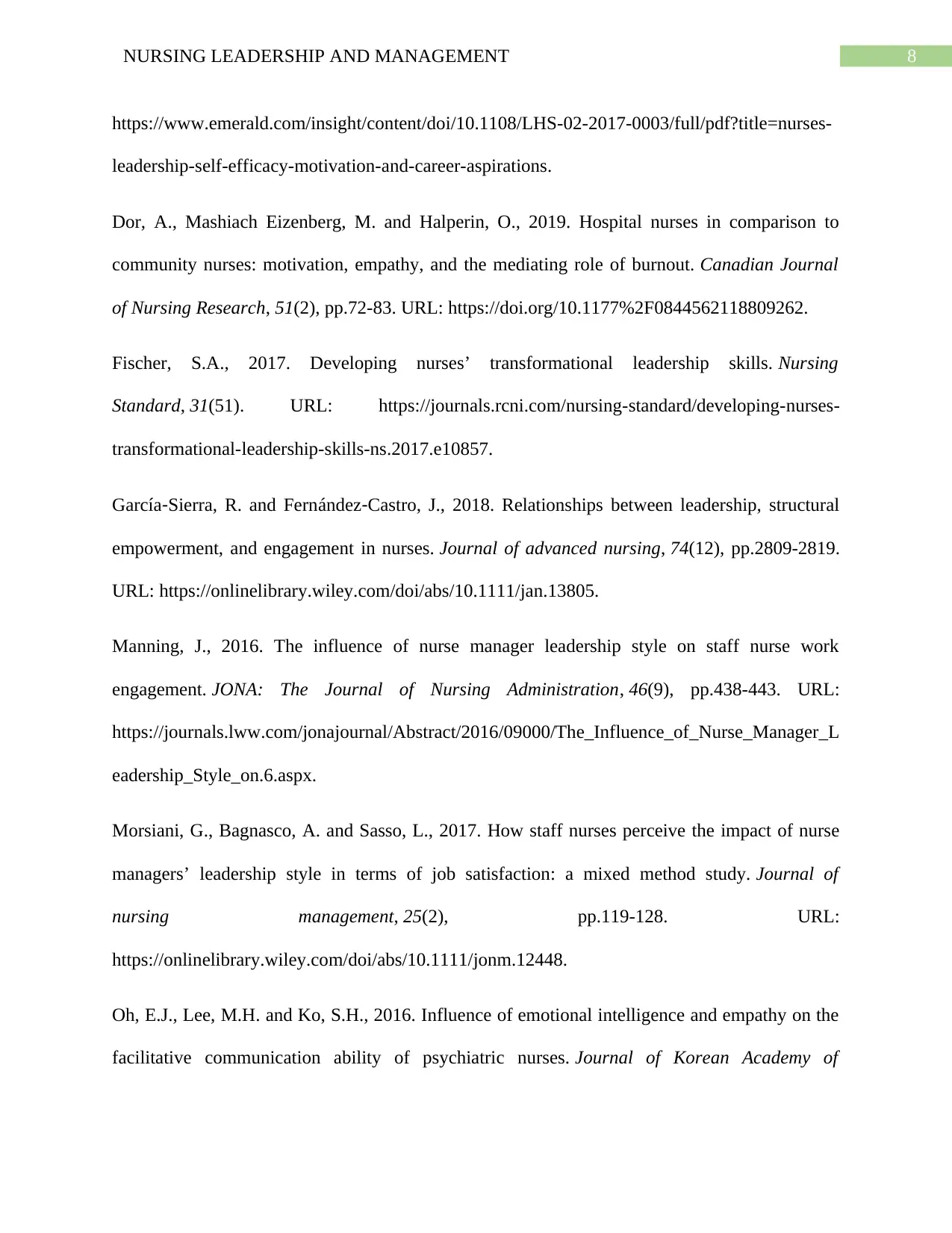
8NURSING LEADERSHIP AND MANAGEMENT
https://www.emerald.com/insight/content/doi/10.1108/LHS-02-2017-0003/full/pdf?title=nurses-
leadership-self-efficacy-motivation-and-career-aspirations.
Dor, A., Mashiach Eizenberg, M. and Halperin, O., 2019. Hospital nurses in comparison to
community nurses: motivation, empathy, and the mediating role of burnout. Canadian Journal
of Nursing Research, 51(2), pp.72-83. URL: https://doi.org/10.1177%2F0844562118809262.
Fischer, S.A., 2017. Developing nurses’ transformational leadership skills. Nursing
Standard, 31(51). URL: https://journals.rcni.com/nursing-standard/developing-nurses-
transformational-leadership-skills-ns.2017.e10857.
García‐Sierra, R. and Fernández‐Castro, J., 2018. Relationships between leadership, structural
empowerment, and engagement in nurses. Journal of advanced nursing, 74(12), pp.2809-2819.
URL: https://onlinelibrary.wiley.com/doi/abs/10.1111/jan.13805.
Manning, J., 2016. The influence of nurse manager leadership style on staff nurse work
engagement. JONA: The Journal of Nursing Administration, 46(9), pp.438-443. URL:
https://journals.lww.com/jonajournal/Abstract/2016/09000/The_Influence_of_Nurse_Manager_L
eadership_Style_on.6.aspx.
Morsiani, G., Bagnasco, A. and Sasso, L., 2017. How staff nurses perceive the impact of nurse
managers’ leadership style in terms of job satisfaction: a mixed method study. Journal of
nursing management, 25(2), pp.119-128. URL:
https://onlinelibrary.wiley.com/doi/abs/10.1111/jonm.12448.
Oh, E.J., Lee, M.H. and Ko, S.H., 2016. Influence of emotional intelligence and empathy on the
facilitative communication ability of psychiatric nurses. Journal of Korean Academy of
https://www.emerald.com/insight/content/doi/10.1108/LHS-02-2017-0003/full/pdf?title=nurses-
leadership-self-efficacy-motivation-and-career-aspirations.
Dor, A., Mashiach Eizenberg, M. and Halperin, O., 2019. Hospital nurses in comparison to
community nurses: motivation, empathy, and the mediating role of burnout. Canadian Journal
of Nursing Research, 51(2), pp.72-83. URL: https://doi.org/10.1177%2F0844562118809262.
Fischer, S.A., 2017. Developing nurses’ transformational leadership skills. Nursing
Standard, 31(51). URL: https://journals.rcni.com/nursing-standard/developing-nurses-
transformational-leadership-skills-ns.2017.e10857.
García‐Sierra, R. and Fernández‐Castro, J., 2018. Relationships between leadership, structural
empowerment, and engagement in nurses. Journal of advanced nursing, 74(12), pp.2809-2819.
URL: https://onlinelibrary.wiley.com/doi/abs/10.1111/jan.13805.
Manning, J., 2016. The influence of nurse manager leadership style on staff nurse work
engagement. JONA: The Journal of Nursing Administration, 46(9), pp.438-443. URL:
https://journals.lww.com/jonajournal/Abstract/2016/09000/The_Influence_of_Nurse_Manager_L
eadership_Style_on.6.aspx.
Morsiani, G., Bagnasco, A. and Sasso, L., 2017. How staff nurses perceive the impact of nurse
managers’ leadership style in terms of job satisfaction: a mixed method study. Journal of
nursing management, 25(2), pp.119-128. URL:
https://onlinelibrary.wiley.com/doi/abs/10.1111/jonm.12448.
Oh, E.J., Lee, M.H. and Ko, S.H., 2016. Influence of emotional intelligence and empathy on the
facilitative communication ability of psychiatric nurses. Journal of Korean Academy of
⊘ This is a preview!⊘
Do you want full access?
Subscribe today to unlock all pages.

Trusted by 1+ million students worldwide
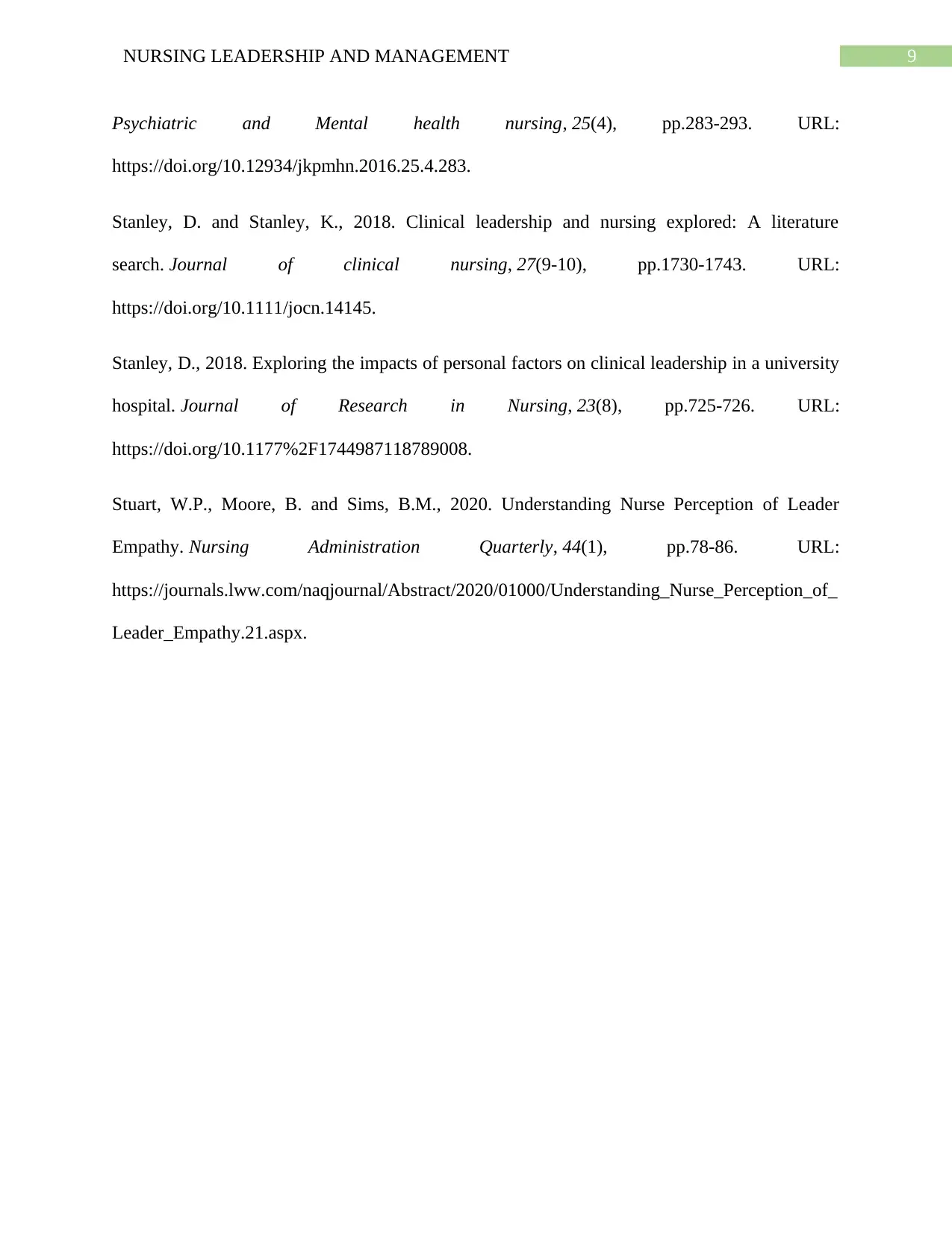
9NURSING LEADERSHIP AND MANAGEMENT
Psychiatric and Mental health nursing, 25(4), pp.283-293. URL:
https://doi.org/10.12934/jkpmhn.2016.25.4.283.
Stanley, D. and Stanley, K., 2018. Clinical leadership and nursing explored: A literature
search. Journal of clinical nursing, 27(9-10), pp.1730-1743. URL:
https://doi.org/10.1111/jocn.14145.
Stanley, D., 2018. Exploring the impacts of personal factors on clinical leadership in a university
hospital. Journal of Research in Nursing, 23(8), pp.725-726. URL:
https://doi.org/10.1177%2F1744987118789008.
Stuart, W.P., Moore, B. and Sims, B.M., 2020. Understanding Nurse Perception of Leader
Empathy. Nursing Administration Quarterly, 44(1), pp.78-86. URL:
https://journals.lww.com/naqjournal/Abstract/2020/01000/Understanding_Nurse_Perception_of_
Leader_Empathy.21.aspx.
Psychiatric and Mental health nursing, 25(4), pp.283-293. URL:
https://doi.org/10.12934/jkpmhn.2016.25.4.283.
Stanley, D. and Stanley, K., 2018. Clinical leadership and nursing explored: A literature
search. Journal of clinical nursing, 27(9-10), pp.1730-1743. URL:
https://doi.org/10.1111/jocn.14145.
Stanley, D., 2018. Exploring the impacts of personal factors on clinical leadership in a university
hospital. Journal of Research in Nursing, 23(8), pp.725-726. URL:
https://doi.org/10.1177%2F1744987118789008.
Stuart, W.P., Moore, B. and Sims, B.M., 2020. Understanding Nurse Perception of Leader
Empathy. Nursing Administration Quarterly, 44(1), pp.78-86. URL:
https://journals.lww.com/naqjournal/Abstract/2020/01000/Understanding_Nurse_Perception_of_
Leader_Empathy.21.aspx.
1 out of 10
Related Documents
Your All-in-One AI-Powered Toolkit for Academic Success.
+13062052269
info@desklib.com
Available 24*7 on WhatsApp / Email
![[object Object]](/_next/static/media/star-bottom.7253800d.svg)
Unlock your academic potential
Copyright © 2020–2026 A2Z Services. All Rights Reserved. Developed and managed by ZUCOL.





